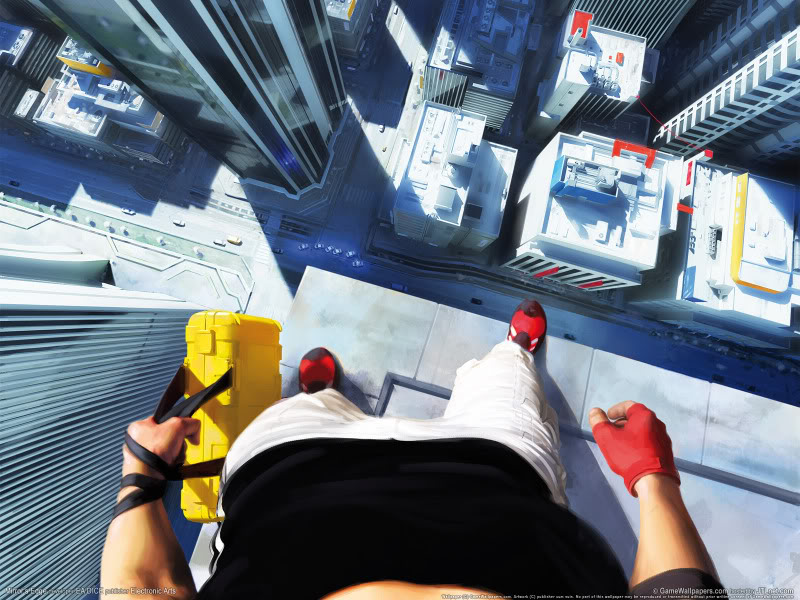July 1, 2010
Mirror’s Edge (A review from our reviewer’s forum)
Review By: Gren
Year: 2008
Developer: EA Digital Illusions CE
Publisher: Electronic Arts
Platforms: Xbox 360, PS3, PC
Degree of Cyberpunk Visuals: High
Correlation to Cyberpunk Themes: Medium
To start, here’s Gren’s take on the recent parkour/free-running game Mirror’s Edge (Link to the Reviewer’s Forum post). I purchased this game via Steam, but couldn’t play since my video isn’t up to specs. Once I do that upgrade and get to play, I’ll post my little review in the comments. Till then, take it away, Gren…
Mirrors Edge was one of those games I was psyched about for months. I hung on every second of the hauntingly beautiful trailers, did my best to chisel out every little detail I could about the games stirring theme: A lone girl named Faith (who happens to be a Parkour expert) attempting to live free in a society ruled by a psychotic surveillance state.

The product they ultimately delivered possessed all of these qualities in theory, but the theme was more or less ignored in favor of a simplified plot involving a kidnapping by the government, a thinly veiled conspiracy, and a daring rescue. It was about when I was sneaking into the office of a pro wrestler turned ‘goon in a suit’ named “Rope Burn” to interrogate him that I realized the game was getting a little bit off message. Also, the game sometimes seems like it’s trying to convey some sort of political message, but apparently it keeps getting confused on which message it’s trying to send. On one hand, the cuddly nanny state which takes the place of the games thematic antagonist is typically a perversion of an overly liberal society (”you don’t need guns, we’ll keep you perfectly safe, there’s cameras everywhere, self defense is so last century”). Yet halfway through the game your apparent enemy becomes a cartoonishly evil Private Military Corporation (which is why it scores “Medium” on the theme rating instead of “Low”), which is a theoretical scenario associated with an overly de-regulated or libertarian society. It’s also entirely possible that this mash up is entirely apolitical, but the theme seems to be at odds with itself in this regard.
There’s a lot of cyberpunk fluff padding out the games plot, such as hideouts bristling with computers constantly monitoring the city’s surveillance grids and police patrols, the members of the protagonist’s organization all have these cool circuitry tattoos denoting some sort of ‘hacker status’, but it rarely has anything at all to do with the game itself. Also, because the cutscenes are delivered in a trashy 2d flash animation style, it removes these elements even further from the experience.
However, the visuals of the game itself warrant a mention. When you’re standing on the edge of a sky scraper, over looking an endless white city sprouting from the earth like fragments of polished bone, speckled with only sporadic blotches of color (usually propaganda billboards), watching cars drift silently up and down the thoroughfares like drone insects, you’ll feel for a moment that the whole is greater than the sum of its parts.

You can find plenty of reviews that will explain the particulars of gameplay and story in gratuitous detail, but for the purpose of this site, suffice to say the gameplay is fair and with an emphasis on movement rather than combat (though combat certainly exists and is seldom optional).
In closing, Mirrors Edge is still an enjoyable game, even with the afformentioned detractors from the plot and theme. It’s extremely linear and has no significant multiplayer to speak of, so replay is limited. It’s definitely not a game for everyone, and some folks will tire of it exponentially faster than others. If you can forgive it’s short comings, though, somewhere in the midst of a forty foot jump between buildings, with the streets below passing like a dizzy dream and the birds scattering in anticipation of your landing, you might find the feeling the game is trying to convey.




